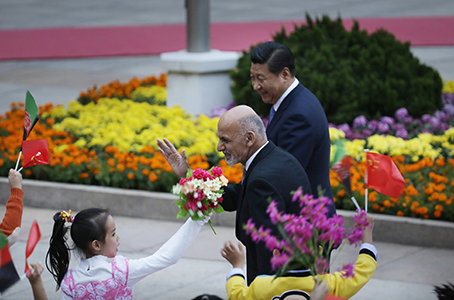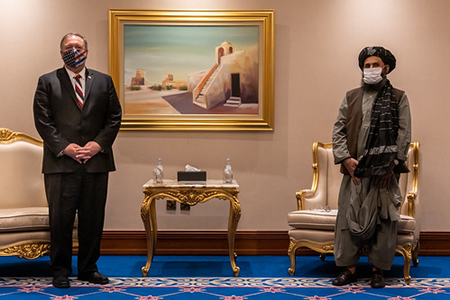History is often destined to repeat itself. Hitler shadowed Napoleon into an irretrievable defeat when he invaded Russia, suffering the ignominious consequences of a scorched-earth policy. It was not that he had not read about Napoleon’s disastrous campaign; it was just that he was too delusional to comprehend that it might happen to him too.
The United States (US) witnessed the Soviet debacle in Afghanistan and celebrated the consequential dissolution of the Soviet Union, but learnt nothing from the episode. Even its own humiliating retreat from Vietnam had no apparent impact on its decision-making to go to war in an insurgency-conflict in someone else’s territory.
Britain, with its history of conflict in Afghanistan, not once, but thrice, tripped over itself to please the US, and boldly marched into another catastrophe. The usual suspects, quick to project their capacities in knocking down a people already knocked down, in response to a manufactured threat, congregated in search of a perceived vindication. Eager to initiate military action against a fabricated resistance, they hoped to subjugate and suppress another nation, never giving a thought to the fact they would be subjecting their own people to a war without a cause. Later, they justified their decisions by shaping perceptions with untruths and deceit as they hurriedly withdrew to their respective countries. Their departure from Afghanistan was characterised by defeat and disgrace. And their embarrassment was exceeded only by the deafening silence, as no one asked any questions. Collective culpability was never on display as it was now — the hypocrisy of democracy in its full glory.
The two Afghan governments set up by the United States — first, the Karzai administration and later, the Ghani-Abdullah arrangement — were both heavily Northern Alliance-oriented as well as pro-India
To initiate war, one must have a reason, a casus belli, never mind if it is manufactured or real. The attack on the Twin Towers in New York offered that perception, but was it the real reason? The Tower Conspiracy remains a difficult rationale to sell; however, it does fulfil the legal requirements of the Security Council and invokes the NATO clause to come to the aid of any member state that is under attack. So armed with an engineered cause and an artificial moral basis, the world went to war against Afghanistan. Some said it was an issue of human rights; others, the emancipation of women. Better still, a modern constitution was on offer and Western Democracy was marketed to save Afghanistan from itself. Others were seized by the issue of a woeful lack of development and sent in contractors and builders to help a nation build an infrastructure and roads that were going to nowhere.
In terms of realpolitik, the US led the pack and its own interests were supreme to anyone else’s. The Chinese regional and global dominance in trade and economy had to be held in check, and Afghanistan provided just the right base to conduct intelligence and subversive operations against China. Iran, of course, was also on the menu and this location was ideal to manage it. Pakistan and its intransigent position on its nuclear outlook could also be easily monitored from Afghanistan, while CPEC-specific disruptive activities could be planned and executed with the help of India. Besides this, the minerals of Afghanistan were worth trillions of dollars.

It is now being said that Afghanistan is moving forward; negotiations are underway; people are talking to each other; demands are being made; bargains are being struck. There are three parties in these talks: the United States, who invaded Afghanistan; the Afghan government that the US installed; and the Taliban who resisted both. The US cobbled together a coalition of 38 countries, including NATO, and facilitated India to set up a development programme to the tune of $3 billion. The two Afghan governments set up by the United States — first, the Karzai administration and later, the Ghani-Abdullah arrangement — were both heavily Northern Alliance-oriented as well as pro-India, to the extent of aligning themselves against Pakistan to please India. As the conflict unfolded, the US —despite its air superiority, total artillery dominance and one-sided mechanised forces — found itself at the losing end. In light of the imminent defeat, the US decided to change track and begin negotiations with the Taliban. Predictably, they did this without the approval or understanding of the Kabul government, thus abandoning their allies, in a sense. Interestingly, the Taliban never asked for negotiations, nor pursued them; it was purely a US initiative.
This change of heart displayed by the US was not on account of their love for peace but because the Taliban had militarily ousted all US-Kabul forces from the rural areas and were now in effective command of most of the spaces in Afghanistan. The US was losing the war and the future did not project anything favourable either, which prompted them to talk their way out. However, there was nothing really to negotiate, except that in the Doha agreement the US laid down the condition that the Taliban would not allow Afghanistan to be used for terrorist activities. Firstly, the Taliban are not the government, at least not as yet, and secondly, they were not in control of all the spaces in Afghanistan, so how could they give such a blanket commitment? And even if they did, what kind of guarantees would there be in place? This was merely a face-saving measure so that the US could say that they had actually come away from Afghanistan with something at the least. The occasional thrasonic threats flung at the Taliban by the US are merely pretensions to military relevance. The US has lost the war and is eager to pull out at any cost.
The Chinese initiative to develop the Belt and Road Initiative (BRI) is essentially a circumvention of the Malacca Straits to secure its current $5 trillion trade that was vulnerable to an Indo-US consortium
So today, in Afghanistan, we have the following activities concurrently underway: negotiations, general violence, a near civil-war like situation, withdrawal of foreign forces, and the presence of Daesh or ISIS — a US insertion in Afghanistan. The Taliban and the government are both attempting to strengthen their positions. India, along with the Afghan Government, are the main spoilers in this show. However, both stand to lose after the foreign occupation ends; the former’s position becomes untenable and the latter’s, unsustainable. So if the present environment does not change, then the writing on the wall is clear. The United States will speed up withdrawal and leave Afghanistan by 2021; the Afghan government will collapse and the leading figures will either go into hiding or flee abroad. India will cut and run; the Taliban will form the government; civil war against the Northern Alliance will continue, and Daesh/ISIS will aggravate the situation by continuing with their violence. This last purposeless exercise will be funded and directed by CIA and RAW to destabilise Afghanistan, with the intent to not allow China a walkover. The major components of Daesh/ISIS will remain with the defeated and ousted Tehreek-e-Taliban Pakistan (TTP) and their re-location in Kunar and Nuristan will be facilitated since their services can be readily employed against Afghanistan, as well as Pakistan.

For the United States, a defeat in Afghanistan would mean being reduced to strangers in the region, thus allowing China an uncontested environment to expand its sphere of influence. This would not be acceptable to the US and they will work towards a more integrated and intimate alliance with India that serves the national interests of both powers. Israel would support any such alliance, while Saudi Arabia and the Middle East would, at best, display an artificial neutrality but in real terms would lean heavily towards an Indo-US alliance. The implications are that China would be targeted in general, but CPEC would be the focus of attention. Pakistan will be seen as a soft underbelly to get to China and will be subjected to disruptive activities. These would include separatist movements in Balochistan, Gilgit-Baltistan and Khyber Pakhtunkhwa, hostile financial regulations such as the FATF, economic and trade sanctions/embargoes, stricter IMF controls, violence in the cities, breakdown of law and order, and political turbulence leading to anarchy.
CPEC is more China’s need than Pakistan’s, though it remains a game-changer for Pakistan. The Chinese initiative to develop the Belt and Road Initiative (BRI) is essentially a circumvention of the Malacca Straits to secure its current $5 trillion trade that was vulnerable to an Indo-US consortium, comprising Singapore, Vietnam, Taiwan, Japan, and the Philippines etc. — all challengers to Chinese influence in the South China Sea. The Chinese initiative in cobbling together the largest ever economic bloc in the region, the Regional Comprehensive Economic Partnership (RCEP), comprising 29 percent of the global GDP, along with CPEC developing Gwadar as the world’s largest trans-shipment port, could not have gone unnoticed. Consequently China, to protect its interests, may very well construct a Security Alliance with Pakistan, Turkey, Iran and Malaysia in the near future, with the possibility of Russian support. Central to both these alliances would be Pakistan, the centre of gravity, an essential component in the Chinese march to global dominance. Pakistan is the most vulnerable in this arrangement and the weakest. This scenario puts Pakistan in the way of animosity, conflict and war in the immediate future — with grave consequences. In this day and age, military conflicts or wars are not fought to occupy ground or space but to force the opponent to acquiesce to specific demands. Pakistan’s future critical decisions to avoid conflict could lead to the dismantling of its nuclear capability, a re-evaluation of the Pak-China relationship, toning down of its position on Kashmir, accepting Indian hegemony as a regional leader and recognition of Israel. If Pakistan refuses to acquiesce to such demands, then it could be the next battle ground between the Chinese-led alliance and the US-led alliance. Pakistan needs to weigh all its options and take some of the steps as under.
Pakistan must review its political structure and consider a new home-grown system, since the current one is based on conflict and confrontation that is easily exploited by outside elements
It must continue to impress upon Washington the importance of becoming part of the CPEC initiative to reap the benefits of global inter-connectivity. By contributing and promoting such connectivity, not only would the United States remain relevant in the region, but could continue to wield a positive influence.
Additionally, it must try and make the United States and the European Union stakeholders in Thar and Reko Diq, with mutually-beneficial arrangements, without jeopardising Chinese interests.
It must avoid conflict, but if forced into one, it should never allow the initiative to slip into the hands of others. A Pak-Chinese collaboration should closely examine the possibility of taking the battle away from this land to elsewhere, failing which Pakistan would be the loser irrespective of who dominates in the conflict.
It must focus on its economy and re-establish its autonomy and sovereignty. This must be done as quickly as possible using the resources at Thar, Reko Diq, its agri-based potential, the Gwadar Port and its already developed trade corridors.
Pakistan stands at the crossroads in a developing new world order. In fact, it is central to it. It needs a sophisticated design and plan to move along with global developments as they unfold
It must assist in stabilising Afghanistan. This must include development of its infrastructure, using local labour to provide gainful employment. Also, it must assist in developing the country’s airline services, and its communication and energy sector. It can be a very useful contributor in organising and coordinating international assistance for mining and processing minerals in Afghanistan.
Further, it needs to develop specified, bio-metric crossing sites on the Afghan border to facilitate, regulate and manage trade.
Afghan refugees must be sent back. Pakistan can assist in establishing refugee camps in Afghanistan with UN assistance. Alongside, intelligence gathering and intelligence-based operations against Daesh, ISIS and TTP must be pursued aggressively. It could initiate a joint regional intelligence system that includes China, Turkey, Iran, Afghanistan and Malaysia, with a presence in the entire region.
Finally, Pakistan must review its political structure and consider a new home-grown system, since the current one is based on conflict and confrontation that is easily exploited by outside elements. The present system facilitates intrusion and allows external powers to influence Pakistan, rather than benefit the country itself.
Pakistan stands at the crossroads in a developing new world order. In fact, it is central to it. It needs a sophisticated design and plan to move along with global developments as they unfold. Half-measures will not do. It is time the country pursued its interests aggressively. Elements that stand in the way have to be confronted and dealt with conclusively, instead of compromising in the hope that the problem will go away. A national dialogue would be a good place to start. Nevertheless, the geography of the country, the resilience of its people, the talent and the natural resources, all combined can give Pakistan the edge that it really needs to make this sovereign nation a country with autonomy, self-respect and pride.





I believe establishment should take an initiative to persuade IK to offer an NRO to PPP & PMLN against structural /constitutional changes including 18th amendment. Parliamentary democracy must be rolled back and Pakistan divided onto 10 administrative divisions. A presidential system with an objective of making Pakistan an Islamic welfare state must be guaranteed by all the stake holders.
You may do whatever. But, making a deal with the DEVIL politicians of the opposition, will kill any hopes of an honest governance for a very long time.